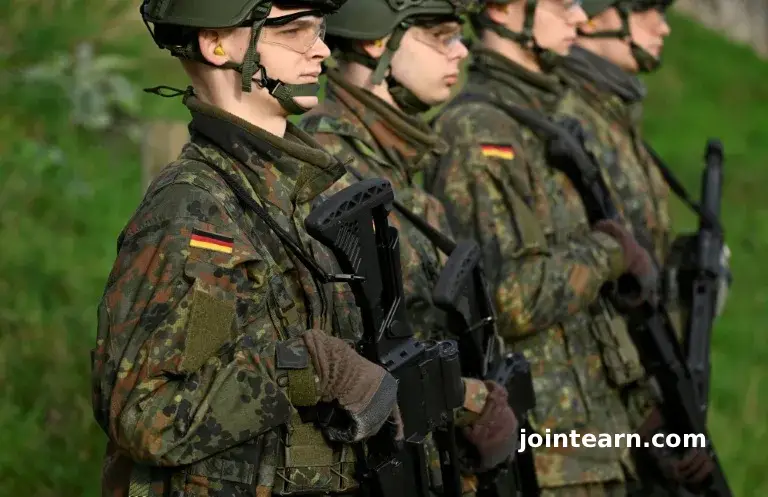
Berlin, November 13, 2025 — Germany’s coalition government has officially agreed to maintain a voluntary model for military service, ending weeks of political debate over whether the country should reinstate a compulsory draft. The decision underscores Berlin’s aim to strengthen the Bundeswehr (German armed forces) while preserving personal freedom for young citizens.
Germany’s New Military Service Plan
Beginning in 2026, all 18-year-old men in Germany will be required to complete a questionnaire about their interest in military service and take part in a physical assessment conducted by the Bundeswehr. However, no one will be forced to enlist, officials confirmed.
Defence Minister Boris Pistorius emphasized that the government’s priority is to make military service appealing rather than mandatory.
“No one will be compelled to join the Bundeswehr,” Pistorius said. “Our focus is on designing an attractive service that motivates people to serve voluntarily.”
The initiative is part of Germany’s broader effort to boost military recruitment and modernize its defense forces in response to heightened tensions with Russia and concerns about the future of U.S. security support for Europe.
Strengthening the Bundeswehr Against Emerging Threats
Chancellor Friedrich Merz has made rebuilding Germany’s under-equipped military a cornerstone of his national defense policy. With Russia’s continued aggression and uncertainty over NATO’s long-term stability, Merz has pledged to turn the Bundeswehr into “the strongest conventional army in Europe.”
To achieve this, his administration has significantly increased defense spending, modernized procurement systems, and introduced incentives for young Germans to consider careers in the military.
“A voluntary, professional, and well-trained army is essential for Europe’s security and for Germany’s credibility within NATO,” Merz said in an earlier statement.
Coalition Debate Over Compulsory Service
The path to the final agreement was not smooth. While Pistorius, from the center-left Social Democratic Party (SPD), championed voluntary service, members of Merz’s conservative CDU/CSU bloc pushed for a “draft lottery” system that could trigger compulsory service if not enough volunteers came forward.
That controversial proposal was ultimately dropped as part of a late-night deal reached on Wednesday.
“If voluntary service is ultimately not enough, then compulsory service will also be necessary,” said Jens Spahn, leader of the CDU/CSU parliamentary faction. “But that would require further legislation.”
Matthias Miersch, SPD parliamentary leader, expressed confidence that the Bundeswehr would attract enough recruits under the voluntary model, calling it “an offer, not an obligation.”
European Models Inspire German Approach
Minister Pistorius cited the success of Nordic countries such as Sweden, Norway, and Finland, where voluntary or semi-voluntary service models have proven effective in maintaining strong national defense forces.
“Other European countries show that voluntary service combined with attractiveness works,” Pistorius said. “I expect the same here in Germany.”
Germany suspended compulsory military service in 2011, ending decades of mandatory conscription. Since then, recruitment challenges and growing security threats have fueled debate about reinstating some form of service obligation.
Focus on Recruitment and National Preparedness
Under the new plan, the Bundeswehr will launch a national awareness campaign aimed at inspiring both men and women to consider military or civil service. This campaign will highlight career benefits, educational opportunities, and community contributions tied to voluntary enlistment.
Officials say the new system also helps the government gather valuable data on young people’s skills, health, and motivation—information that could be used to expand the armed forces if geopolitical conditions worsen.
“Compulsory service remains a last resort,” Pistorius reiterated. “For now, we are confident that voluntary participation will meet our defense needs.”
Germany’s Strategic Shift in Defense Policy
The decision comes amid a broader European military reawakening, as countries including Poland, Finland, and the Baltic states expand their forces in response to what many view as a more aggressive Russia.
For Germany, the move toward voluntary service reflects a balancing act — bolstering defense readiness while respecting democratic values and personal choice.
Analysts say the government’s long-term success will depend on whether it can restore public trust in the Bundeswehr, address equipment shortages, and present military service as a modern, respected career path.


Leave a Reply